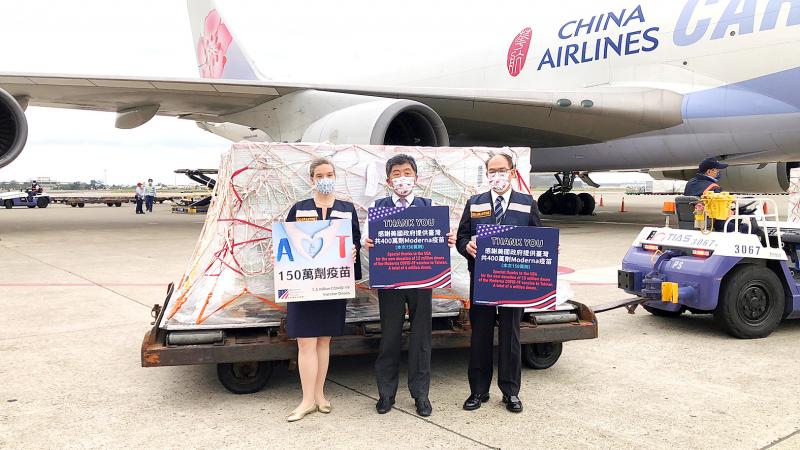The Central Epidemic Command Center (CECC) yesterday thanked the US for donating another 1.5 million doses of the Moderna COVID-19 vaccine, while announcing new rules that would allow inbound travelers to spend the first day 10 days of their 14-day quarantine period at a centralized facility or hotel and the remaining four days at home.
Together with the 2.5 million doses that arrived in June, the US has donated a total of 4 million doses of the Moderna vaccine to Taiwan, Deputy Minister of the Interior Chen Tsung-yen (陳宗彥), the deputy head of the center, told a daily news briefing.
American Institute in Taiwan (AIT) Director Sandra Oudkirk, Minister of Health and Welfare Chen Shih-chung (陳時中), who heads the CECC, and Deputy Minister of Foreign Affairs Harry Tseng (曾厚仁) were at Taiwan Taoyuan International Airport to welcome the arrival of the vaccines at 1:43pm.

Photo: CNA
“These donations reflect our commitment to Taiwan, a vibrant democracy, valued partner and trusted friend.” Oudkirk said at the airport. “Partners support each other, especially under tough circumstances, and our support for Taiwan, through vaccines or otherwise, is rock solid.”
“The United States and Taiwan are proving what we can do when we collaborate to address shared challenges,” she said, adding that the vaccine delivery is another great example of the AIT’s and Taiwan’s close friendship as “real friends, real progress.”
Chen Shih-chung said that when a local COVID-19 outbreak occurred in May, the US government quickly donated 2.5 million doses of vaccines on June 20, allowing Taiwan to start its vaccination program when it lacked critical supplies.

Photo: CNA
The latest delivery can be used to vaccinate people waiting for their second dose of the Moderna vaccine, as a first dose for some “Moderna-only fans” or even included in a mix-and-match regimen, he said, adding that Taiwan is very grateful to US President Joe Biden’s administration for being a “real friend.”
The CECC yesterday reported five imported cases of COVID-19, but no local infections or deaths.
The five arrived from Indonesia, Myanmar, Nepal and Ukraine, Chen Tsung-yen said.
As many Taiwanese are expected to return to the country during the Lunar New Year holiday in January next year, the CECC and other government agencies have discussed the issue and made preparations, he said.
The Lunar New Year holiday quarantine measures are to be implemented from Dec. 14 to Feb. 14 next year, he said.
“First of all, the mandatory 14-day quarantine followed by seven days of self-health management for inbound travelers will remain in place,” he said.
Inbound travelers who have traveled to “key high-infection risk countries” 14 days prior to arriving in Taiwan will have to stay in a centralized quarantine facility for 14 days, he said.
Countries on this list include India, Myanmar and the UK, he said, adding that the list would be modified depending on COVID-19 developments worldwide.
As for inbound travelers arriving from other countries, they will still be required to stay in a quarantine hotel or self-paid centralized quarantine facility for the first 10 days of quarantine, and an additional polymerase chain reaction (PCR) test would be required on the ninth or 10th day of quarantine, he said.
If they tested negative, they could choose to spend the remaining four days of quarantine at home, he said.
They have to take a disease prevention taxi or vehicle to return home and must follow the rule of “only one person per household,” or “one person per room” if all household members have been fully vaccinated, he added.
Family members or coresidents who arrived in Taiwan together on the same day would also be allowed to stay in the same hotel room during quarantine, he added.
As inbound travelers are subject to three PCR tests during quarantine — upon arrival, on the ninth or 10th day and upon ending it — they do not need to take a COVID-19 rapid test at home before ending self-health management, he said.

CHAOS: Iranians took to the streets playing celebratory music after reports of Khamenei’s death on Saturday, while mourners also gathered in Tehran yesterday Iranian Supreme Leader Ayatollah Ali Khamenei was killed in a major attack on Iran launched by Israel and the US, throwing the future of the Islamic republic into doubt and raising the risk of regional instability. Iranian state television and the state-run IRNA news agency announced the 86-year-old’s death early yesterday. US President Donald Trump said it gave Iranians their “greatest chance” to “take back” their country. The announcements came after a joint US and Israeli aerial bombardment that targeted Iranian military and governmental sites. Trump said the “heavy and pinpoint bombing” would continue through the week or as long

TRUST: The KMT said it respected the US’ timing and considerations, and hoped it would continue to honor its commitments to helping Taiwan bolster its defenses and deterrence US President Donald Trump is delaying a multibillion-dollar arms sale to Taiwan to ensure his visit to Beijing is successful, a New York Times report said. The weapons sales package has stalled in the US Department of State, the report said, citing US officials it did not identify. The White House has told agencies not to push forward ahead of Trump’s meeting with Chinese President Xi Jinping (習近平), it said. The two last month held a phone call to discuss trade and geopolitical flashpoints ahead of the summit. Xi raised the Taiwan issue and urged the US to handle arms sales to

BIG SPENDERS: Foreign investors bought the most Taiwan equities since 2005, signaling confidence that an AI boom would continue to benefit chipmakers Taiwan Semiconductor Manufacturing Co’s (TSMC, 台積電) market capitalization swelled to US$2 trillion for the first time following a 4.25 percent rally in its American depositary receipts (ADR) overnight, putting the world’s biggest contract chipmaker sixth on the list of the world’s biggest companies by market capitalization, just behind Amazon.com Inc. The site CompaniesMarketcap.com ranked TSMC ahead of Saudi Aramco and Meta Platforms Inc. The Taiwanese company’s ADRs on Tuesday surged to US$385.75 on the New York Stock Exchange, as strong demand for artificial intelligence (AI) applications led to chip supply constraints and boost revenue growth to record-breaking levels. Each TSMC ADR represents

Pro-democracy media tycoon Jimmy Lai’s (黎智英) fraud conviction and prison sentence were yesterday overturned by a Hong Kong court, in a surprise legal decision that comes soon after Lai was jailed for 20 years on a separate national security charge. Judges Jeremy Poon (潘兆初), Anthea Pang (彭寶琴) and Derek Pang (彭偉昌) said in the judgement that they allowed the appeal from Lai, and another defendant in the case, to proceed, as a lower court judge had “erred.” “The Court of Appeal gave them leave to appeal against their conviction, allowed their appeals, quashed the convictions and set aside the sentences,” the judges